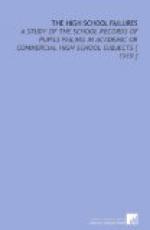A limited number of records were available in one school for the pupils who failed in the first semester of a subject, and who were permitted to continue the subject conditionally a second semester without first repeating it. Not all pupils were given this privilege, and the conditions of selection were not very definite beyond a sort of general confidence and promise relative to the pupil. The after-school conference was the only specific means provided for aiding such pupils. But 52 per cent of such subjects were passed in this manner, and the subsequent passing compensated for the previous failure as to school credit.
GRADES FOR FAILING PUPILS WHO CONTINUE THE SUBJECT WITHOUT REPETITION
A B C D
259 Boys ..
7 133 119
249 Girls .. 3
119 125
------------------
Per Cent of Total .. 52
48
A difference of judgments may prevail as to the significance of these facts. Although the passing grades secured are not high, 52 per cent have thus been relieved from the subject repetition, which on the average results in 33.3 per cent of failures, as has been noted in section 1 of this chapter.
A much more ingenious device for enabling at least some pupils to escape the repetition and yet to continue the subject was discovered in one school, in which it had been employed. Briefly stated, the scheme involved a nominal passing grade of 70 per cent, but a passing average of 75 per cent; and so long as the average was attained, the grade in one or two of the subjects might be permitted to drop as low as 60 per cent. Then in the event of a lower average than 75 per cent, it might be raised by a new test in the favorite or easiest subject, rather than in the low subject. By this scheme the grades could be so juggled as to escape repetition or other direct form of reparation in spite of repeated failures, unless perchance the grades fell below 60 per cent. By a change of administration in the school this whole scheme has been superseded. But it had been utilized to the extent that the records for this school showed practically no repetitions for the failing pupils.
A SUMMARY OF CHAPTER V
Among the school agencies for disposing of the failures, repetition of the subject is the most extensively employed.
Thirty-three and three-tenths per cent of the repeated grades are repeated failures.
Few of the repeaters take reduced schedules.
The repeaters with an extra schedule are more successful in each of the passing grades, and have 11.4 per cent less failures than repeaters with a normal or reduced schedule.
In the later subjects of the same kind, after failure and repetition, the unsuccessful grades are 2.2 per cent higher than for a similar situation without any repetition.




